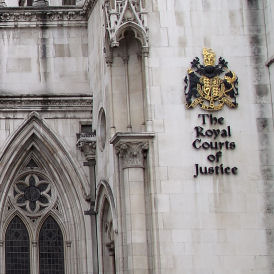Council cuts in adult care unlawful
Two severely disabled adults have won a ‘landmark’ High Court battle against Isle of Wight Council over cuts to adult care.

Isle of Wight Council‘s plans to reduce its adult social care budget were ruled unlawful by a High Court judge today.
In February, following a consultation into spending cuts, the council approved plans to adopt new criteria to decide eligibility for community care, which would restrict adult social care support to only those judged to have “critical” and “substantial” needs.
Court action was then launched against the council on behalf of two claimants, vulnerable adults with communication difficulties, referred to as JM and NT. Their families argued the council’s new policy could have a potentially “devastating” effect on their quality of life.
The first claimant, JM, aged 32, has severe autism and a brain injury suffered at birth. He lives with his retired parents and needs support with all areas of his life throughout the day.
The second claimant, NT, aged 31, also has autism and a learning difficulty. He lives in residential accommodation provided by the council during the week, but returns home to his mother every weekend.
In court it was argued that disabled people on the Isle of Wight could lose all or parts of their social care packages currently provided by the Council as a result of the proposed changes.
The judge found that the consultation document “provided insufficient information” to enable those consulted on the criteria changes “to give intelligent consideration and an intelligent response”.
Lawyer Alex Rook, of Irwin Mitchell, who represented JM and NT, said: “This landmark victory sends out a very clear message to all councils in England and Wales.
“If a council seeks to make cuts to its budget for adult social care, it cannot do so by only meeting certain needs designed to keep someone safe, but neglecting their overall quality of life.
“The judgment also makes it very clear that if a thorough and full consultation process is not carried out when considering proposed cuts to services to disabled adults, the courts will quash the policy.”
The National Autistic Society (NAS), which was directly involved in the case, today welcomed the ruling which “sets an important precedent for social care provision across the country”.
Mark Milton, Chief Operating Officer of the NAS, said: “The High Court ruling has prevented potentially devastating cuts from going ahead, which could have severely impaired the quality of life for many of the island’s most vulnerable people who desperately need support.”
Richard Hawkes, Chief Executive of the disability charity Scope, told Channel 4 News he understood the pressures councils are currently under, but argued that “there are creative ways to strike a balance between saving money and protecting frontline support”.
Mr Hawkes said: “Thousands of disabled people rely on social care support for help with day to day tasks such as washing, dressing, getting out into the community or even getting to work.
“Councils must do everything they can to consider the impact of changes and consult with those affected; getting decisions wrong could prevent disabled people from living a full and active life and making an active contribution to society.”
Isle of Wight Council said the cuts were the result of having to make “budget savings within a short timeframe”.
Councillor David Pugh, leader of the Isle of Wight Council and Councillor Roger Mazillius, cabinet member for adult social care, housing and community safety, said: “We accept the judge’s decision that that we did not provide sufficient information and that, in our attempts to explain what was a complex decision, we unintentionally breached some elements of the guidance.”
The council will now comply with the judge’s ruling and return to its previous eligibility threshold. “We will not be appealing the decision,” they said.
Unlawful cost-cutting
The ruling is the second High Court judgment this week to deem councils' cost-cutting strategies as illegal.
On Wednesday another landmark High Court case judged that Sefton council in Merseyside acted illegally when it froze payments to residential care homes for the elderly for two years running.
In May, a High Court judge described Birmingham Council's plan to cut care for the disabled as unlawful.
But not all cases against cuts which affect vulnerable members of society have been successful.
In July, the Supreme Court turned down the appeal of a former ballerina after Kensington and Chelsea Council assessed her as being no longer in need of overnight care.
A spokesperson for Scope told Channel 4 News: "When it comes to councils being taken to court for cutting services to disabled people, there are broadly two types of story: firstly, where questions are raised about individual assessments and secondly where the council is changing the support it provides either by shifting the threshold for receiving care or by shutting down an entire service."
Today’s story about the Isle of Wight relates to the latter – the council wanted to raise the threshold for people receiving care, but their consultation was ruled to be inadequate."
-
Latest news
-
Windrush scandal: returning to the UK after a forty year wait6m

-
Netanyahu ‘survival’ depends on ‘expanding war’ says head of Palestinian National Initiative5m

-
Proposed law change could strip parental rights from paedophiles5m

-
Hugh Grant settles privacy lawsuit against The Sun newspaper publisher2m

-
Post Office Scandal: what did top executive know?6m

-




